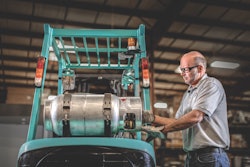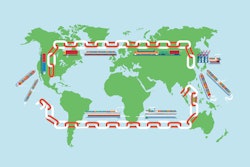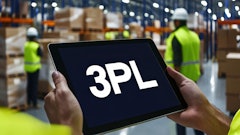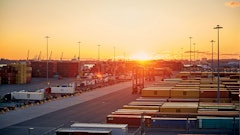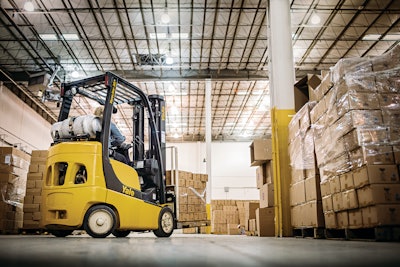
When material handling professionals are selecting the best equipment for their operation, it typically comes down to propane and electric. While both energy sources offer unique advantages, propane checks all the boxes important to keep crews operating efficiently with minimal impact on the environment and their bottom line.
It’s important to see how these energy choices compare in terms of common purchasing priorities like emissions, cost, reliability and performance.
Environmental impact
Clean emissions are a growing priority among material handling professionals as the industry works hard to fight climate change and support cleaner air quality. When people think of forklift fuels on the market, they assume that electric is the cleanest because of its perceived zero emissions operation. Truth is, crews need to consider the full site-to-source emissions of electric and when you compare the two, propane offers a more transparent emissions profile.
Electric forklifts’ site-to-source emissions include all the emissions created during the generation and distribution of electricity, as well as the emissions produced in the production of electric batteries. And, because the Environmental Protection Agency (EPA) considers electric batteries a hazardous material, operators can’t simply dispose of them without severely impacting the environment. Propane forklifts also produce up to 76% fewer sulfur oxide (SOx) emissions than electric forklifts, according to an emissions analysis conducted by the Propane Education & Research Council (PERC) and the Gas Technology Institute.
Click here to hear more about renewable energy in the supply chain:
Productivity and performance
Every material handling operation wants to avoid costly downtime. Propane keeps businesses operating around the clock avoiding work stoppages. Propane-powered forklifts provide 100% power throughout operation, pushing heavy loads at full capacity faster and longer than electric forklifts. One cylinder typically covers an entire eight-hour shift. In addition, propane forklifts maintain more consistent travel speeds and acceleration throughout a shift compared to battery-powered forklifts, according to data from PERC.
Operators using propane equipment can get back to work sooner and maintain high productivity standards versus waiting on lengthy recharge times or challenging refueling needs. Whether used in large operations or smaller fleets, propane provides the quick refueling necessary to keep material moving. Swapping out an empty propane cylinder for a full one takes just a few minutes, and eliminates the need for additional expensive, heavy batteries, downtime spent recharging or strict battery management by crews. Businesses can also set up a tailored refueling schedule with their local propane supplier to ensure that cylinder cages are always full.
Because propane offers the versatility to handle virtually every workload size and most notably, dominates the middle and top weight classes of forklifts with a 90% market share of Class 4 and 5 forklifts being powered with propane.
Cost of ownership
Implementing sustainable business practices can sometimes come with a higher price tag, but with propane, companies can see significant cost savings because of their emission reduction efforts.
Capital costs of propane-powered forklifts are almost 30% lower than those for electric, when factoring in the equipment needed for battery recharging. Propane helps avoid these extra expenses and offers cost savings throughout ownership, allowing businesses to save money for other line items like new employees, additional training, or business development, to name a few.
Propane cylinders last three times longer than electric forklift batteries and their lifespan isn’t affected by the amount of fuel left in the tank, whereas a battery with too high or too low of a charge can have a much shorter lifespan. Businesses operating propane can also lock in a fuel contract with their local propane supplier for more savings and financial peace of mind.
When companies are selecting the best equipment for their specific material handling needs, it’s important to keep in mind cost, performance and the true environmental impact. Forklifts running on propane today make it easy to make the right decision.





